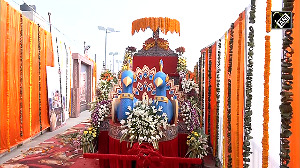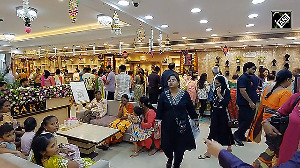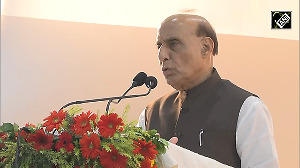It was the iconoclast Andy Warhol who said every individual in the world is entitled to 15 minutes of fame. But fame is a finite resource, and therefore fallible to inequitable distribution. On that premise here is a very partisan review -- love me or hate me for it -- of the year in pop music for India. This is not about winners and losers, but about who deserved their 15 minutes in the limelight for the best and worst of reasons, in no chronological order. That women who lisp 'basically' five times in a single sentence cannot qualify to be pop stars was evident in the Indian music industry's most garish venture yet. On the lines of the British group Spice Girls and Australia's Bardot was born Viva, touted by the industry's archangels as 'India's very own girl band.' Memorable mostly for their Coca-Cola red drag and pancake makeup, the five hip-swinging sistahs of Viva together comprised the Frankenstein's monster gleefully assembled by Channel [V], Times Music and sundry luminaries. The hunt for India's girl band trawled Indian cities for young belles with photogenic mugs, tweezer-friendly eyebrows and pneumatic busts -- in short, anything but musical talent. And why? Because the music, if you insist on calling it that, was already there and waiting, written by Bollywood lyricist Javed Akhtar and composed by eight music directors, including Jatin-Lalit and Sandeep Chowta. They just needed five fresh talking, er, singing heads to go with it. Preened and groomed like supermodels by none less than outfitter Manish Malhotra, Viva was made to cut one eponymous album. A few music videos also showed up, mostly on Channel [V]. And then rumours were rife in December that Viva had disbanded. But not before raking in the moolah. With millions latching on in their living rooms, TRP ratings simply soared. Star TV COO Sameer Nair went on record in August to say, 'Popstars was the flagship show on the channel and it performed that role as expected, fuelling growth in shares and increasing the stickiness of the channel.' Oh, so that's what it was all about. 2002 was also the year of some of the biggest live rock performances the country has hosted, almost all of them in Bangalore, thanks to the city's low rates of entertainment tax -- ten per cent against 49 per cent in Mumbai. Early April saw the arrival of the erstwhile Pink Floyd leviathan Roger Waters. Trainloads of Floydian pilgrims flocked to the southern city from Delhi, Mumbai and Kolkata. Three special trains, rumour mills said, freighted fans from the rock-crazed Northeast. The émigrés floated in and out of the city's numerous watering holes. Pubs baled out beer like water. The haunt of the faithful rocker, Pecos on Rest House Road, was drained of a week's supply of the brew. 'It's my job,' he replied with a wry smirk. 'That's what I do, you know.' It was evidence enough that Waters had arrived 'in the flesh,' as his tour was called. The scathing, sardonic irony that permeates his lyrics was alive and twitching. And with it the promise that he would not let anybody down. In The Flesh presented a panorama of surround sound, whispering voices, multimedia and dazzling lights like the country had never experienced before. Swathed in a haze of pot smoke and glowing cigarette lighters, the concert on April 13 turned out to be, as Waters once wrote in a Floyd song, the greatest show on earth. Well, at least this side of the Royal Albert Hall. But the disappointment of the touring lot was Elton John. Weeks before his arrival on November 5, Bangalore held a candle in the wind to the Rocket Man, toasting him with giant vinyl hoardings featuring his bucktoothed grin. When Sir Elton finally took stage, crowds that had shelled out between Rs 1,000 and Rs 5,000 to brave the nippy evening breeze at the Palace Grounds were disgruntled. As they remained standing for two hours, Sir Elton serenaded them, plonking on his piano. There were no accompanying musicians, no back up band. The concert, more of a pop piano recital, might as well have been held at The Oberoi. Hope, even if just a narrow ray, came from the underground music movement. The Allahabad-based music magazine RSJ, formerly known as Rock Street Journal, broke format from profiling popular Western acts to do a cover story in its October issue on five Indian rock bands that had released original albums, mostly on independent labels. Stealing the thunder were Bangalore's Thermal And A Quarter (Jupiter Café), Metakix (Headlines) and Pentagram (Up) from Mumbai, Orange Street (Candy Walk) from Delhi and Kochi's Mother Jane (Insane Biography). RSJ editor and publisher Amit Saigal told rediff.com, "So far the Indian rock scenario was about bands playing covers and it's ridiculous to do a cover story on a band playing somebody else's music. But now that's changed, and though I still wouldn't yet do a cover story on one Indian band, it's time to acknowledge bands that are breaking out." Indian rock, it is now established, isn't dead -- it was only comatose. Fifteen minutes is too little time in the sun, but that's my take on the year's most defining moments for pop music in India. If your 15 minutes do not tally with mine, or worse still, if you have a loaded revolver out for me by now, please, as Elton John said, 'Don't shoot me, I'm only the piano player.'
 Viva -- the name was concocted from the Roman numeral V for five, and 'diva' -- was 'hand picked,' to exploit a tired industry-standard phrase, from among a hysterical multitude of wannabes from across the country. The run-up to the event began -- where else, but on television -- in a Channel [V] spot called Popstars.
Viva -- the name was concocted from the Roman numeral V for five, and 'diva' -- was 'hand picked,' to exploit a tired industry-standard phrase, from among a hysterical multitude of wannabes from across the country. The run-up to the event began -- where else, but on television -- in a Channel [V] spot called Popstars.  On April 12, when Waters landed at Bangalore airport from Hong Kong preceded by 32 tons of equipment, a journalist representing a local newspaper asked him why he was touring.
On April 12, when Waters landed at Bangalore airport from Hong Kong preceded by 32 tons of equipment, a journalist representing a local newspaper asked him why he was touring. With dinosaur rock giving way to new age metal in the West, bands of yesteryear made a beeline to India. British hard rockers Deep Purple, who had first set Bangalore ablaze in April 2001, proved they hadn't had enough. The mostly 50-plus vets skipped Bangalore and played to audiences in Mumbai and Goa in May. Head-bangers reportedly had a ball. And new converts to dinosaur rock, it is said, feverishly ripped down Britney Spears from their walls.
With dinosaur rock giving way to new age metal in the West, bands of yesteryear made a beeline to India. British hard rockers Deep Purple, who had first set Bangalore ablaze in April 2001, proved they hadn't had enough. The mostly 50-plus vets skipped Bangalore and played to audiences in Mumbai and Goa in May. Head-bangers reportedly had a ball. And new converts to dinosaur rock, it is said, feverishly ripped down Britney Spears from their walls. Reinvention and reincarnation also had a place in the sun this year. July saw old Mumbai boys Alms for Shanti release their album Kashmakash. After moulting out of their avatars as Rock Machine and Indus Creed, vocalist Uday Benegal and guitar player Jayesh Gandhi, who have moved base to New York City and broken into the city's competitive club circuit, appear to have inched closer to discovering their sound. Though still creaky in places, Kashmakash has an indie appeal and is embellished by big league guest performers like percussionist Taufiq Qureishi. Alms for Shanti is now at a crossroads -- where they go from here would be their dilemma.
Reinvention and reincarnation also had a place in the sun this year. July saw old Mumbai boys Alms for Shanti release their album Kashmakash. After moulting out of their avatars as Rock Machine and Indus Creed, vocalist Uday Benegal and guitar player Jayesh Gandhi, who have moved base to New York City and broken into the city's competitive club circuit, appear to have inched closer to discovering their sound. Though still creaky in places, Kashmakash has an indie appeal and is embellished by big league guest performers like percussionist Taufiq Qureishi. Alms for Shanti is now at a crossroads -- where they go from here would be their dilemma.





